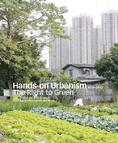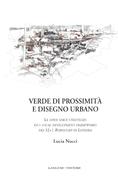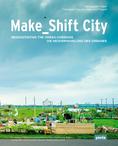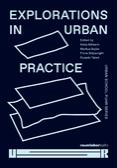public art premio tesi di laurea European policies adi progetto urbano città storica giornata di studi inu landscapes landscape renaissance urbanism social practices heritage creativity ecology conferences sociology urban practices public policies governance inu study day inclusive processes spatial planning events fragile territories
Hands on Urbanism 1850-2012 The Right to Green
Elke Krasny (edited by), Architekturzentrum Wien
The spring show at the Architekturzentrum Wien (15 March - 25 June 2012) was dedicated to the history of the idea of appropriating land in urban space. Since the shockwave of modernisation that accompanied industrialisation towns and cities worldwide have had to face some very significant challenges, city-dwellers have always found a number of solutions in crisis situations, they are involved in bottom-up urban development. Self-build and selforganisation, settlements and fruit and vegetable gardening lead to other forms of collective cohesion, neighbourliness and fair distribution. Another world can be planted, as today's community gardeners are clearly showing.
Following many years of international research, the curator Elke Krasny presents 19 historical and contemporary case studies of bottom-up urban development in Chicago, Leipzig, Vienna, Bremen, New York, Paris, Hong Kong, Istanbul, Porto Alegre, Havana or Quito.
They provide an overview of informal, self-organised collective movements and of the spaces that are created by them. The exhibition shows how decisively small projects have often led, and are still leading, to major changes.
'Hands-On Urbanism' introduces an alternative urban history, one that poses urgent questions about the responsibility of design for architects and planners, and the resource-logic of towns and cities. What do architects do in this process, and what can be learned from the bottom-up in this urban history? Its role ranges from initiative via activism to conducting research. How are urban planning authorities reacting to these developments? The spectrum ranges from the founding of a settlement regulatory agency, via infrastructural measures and tolerance, to measures of support from the authorities, but also the introduction of new laws and legal sanctioning in official urban plans.
CONTENTS
Vorwort
Dietmar Steiner
• Hands-on Urbanism 1850-2012. Vom Recht auf Grün
Elke Krasny
• Felder gemeinsamen Genießens
Phoebe Giannisi, Zissis Kotionis
• So man die Früchte sehen will
Fallen Fruit:Matias Viegener,David Burns und Austin Young
• Der Mainstream des Informellen: Urbanistische Forschung zwischen Romantisierung und städtischer Realität
Anke Hagemann
• Der Schreberplatz in Leipzig
Caterina Hildebrand
• Schrebergärten in Wien
Una Steiner
• Rekreation als öffentliche Aufgabe urbaner Gemeinschaften
Jane Addams
• Urbanes Gärtnern und die Erzeugung von Gemeinschaft
Lisa Heldke
• Selbsthilfe als Reformbewegung Der Kampf der Wiener Siedler nach dem 1. Weltkrieg
Klaus Novy
• Tomaten in der Gartenstadt
Andrea Seidling
• Kaisenhäuser – Wohnen auf der Parzelle in Bremen
Kirsten Tiedemann
• Squattersiedlungen: Architektur, die funktioniert
John F. C. Turner
• Der Baukasten einer kreisförmigen Handlungsstrategie
Daniel Kerber
• Erkenntnisse aus dem Mexicali Experimental Project
Ana Laura Ruesjas
• Sarigöl. Ein Gecekondu in Istanbul im Brennpunkt urbaner Krisen
ISSSresearch, Ingrid Sabatier, Stephan Schwarz
• Laboratorien der urbanen Landwirtschaft: Von Havanna bis Milwaukee
Bohn & Viljoen Architects: Katrin Bohn, André Viljoen
• Eine unerwartetes Lehrstück über Architektur. Mein Besuch im Centro de Educação Ambiental da Vila Pinto
Felipe Hernández
• Hinter der Blechwand: die Welt
Elke Krasny
• Transnationales Bauen im Settlement im Grenzland: Mr. Leung und die Cottages in Ma Shi Po
Shu-Mei Huang
• Das Blatt wendet sich – Hongkong, Ma Shi Po und ich
Chi-Ho Chung
• The Cook, the Farmer, his Wife and their Neighbor
Marjetica Potrč
• Die Idee war gut. Die Hoffnungen wurden enttäuscht.
Lucia Babina
• Die Aneignung der Topografie: Eine informelle Ökologie des Wachstums. Eine Untersuchung der Quebradas von Quito
Pablo Molestina, Catherine Venart
• Learning from Philadelphia
Françoise Fromonot
• Beyond a Construction Site.
Eine nachbarschaftliche Gartenintervention auf einem vernachlassigten Stuck Stadt in Ljubljana.
Obrat
• R-Urban: Zukunftsfähigkeit
Constantin Petcou, Doina Petrescu Atelier d’architecture autogérée
Dank und Biografien
ABOUT THE CURATOR
Elke Krasny is a cultural theorist, curator, urbanist and author, based in Vienna. She researches on the interrelations of architecture, urban space, issues of cultural identity and representation, engaged art practices, gender and world fairs, museums and exhibitions as cultural formations.
She teaches Art and Public Space, Museum Pedagogy, Visual Didactics, Didactics of Architecture and Space and Cultural Education at the Academy of Fine Arts Vienna, "Garden as Community" at the Technical University of Vienna, Cultural Studies at the FH Joanneum Graz and is a visiting professor at the University of Bremen "Urban Transformation and its Narratives" 2006.
For further information please visit her website:
http://www.elkekrasny.at/
Related articles:




Planum
The Journal of Urbanism
ISSN 1723-0993
owned by
Istituto Nazionale di Urbanistica
published by
Planum Association
ISSN 1723-0993 | Registered at Court of Rome 4/12/2001, num. 514/2001
Web site realized by ChannelWeb & Planum Association | Powered by BEdita 3
















